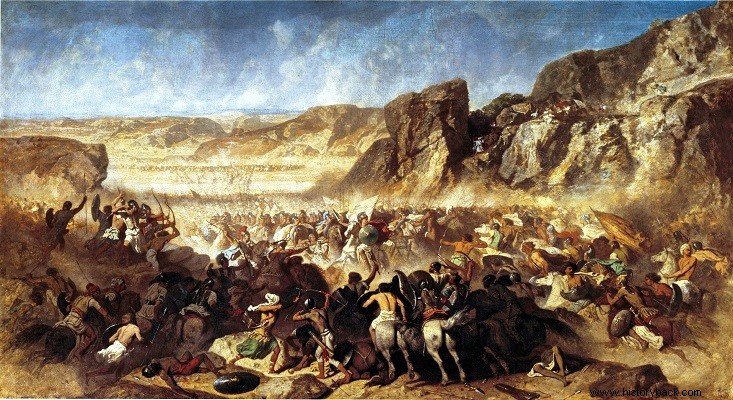
The Myrians were nothing more than a mercenary body. They were recruited by the brother of the Persian king, Cyrus, to be used in his attempt to seize the Achaemenid throne. After the death of Cyrus in the battle of Kounaxa, the Persians misled the Greek generals and killed them, along with other officers. A captain with entrails in his hands managed to reach the Greek camp and convey the news of the massacre before he passed out.
The beheading of the army naturally caused the men to become completely demoralized. Amid the climate of discouragement a new leader appeared. It was Xenophon the Athenian who followed the Myrians as an observer.
"...those who seek to save their lives in war by all means die most cowardly and ingloriously, and those who think of death as common and inevitable for all men and strive for a glorious death , I see that they usually reach old age and live happily", said Xenophon , managing to revive the morale of the Greeks.
Immediately the excitement returned. The Greeks were ready to start. Before they could, however, the Persian general Mithridates - a former loyalist of Cyrus - appeared. The Persian asked to know the plans of the Greeks, "as their friend that he was, so that he too could be saved with them". The Greeks, through the Spartan general Chirosophus, replied that they intended to leave for their homeland. Mithridates replied that it was impossible for them to escape without the king's consent.
The first nasty collision and the countermeasures
The Greeks did not care and started marching again. But suddenly Mithridates appeared with 200 horsemen (horse archers) and about 400 light archers and slingers under his command. At first Mithridates and his men pretended to be friends. But when they came within shooting distance, they began to fire en masse against the Greeks, causing several casualties.
Particularly negative was the fact that the Greeks could not return the blows because the small Cretan archers were behind the hoplites and could only shoot overhead and their bows had a shorter range than the Persians. In order to relieve themselves a little, the Greeks of the rearguard rushed against the enemies who, playing the game of cat and mouse, retreated and returned again taking advantage of their speed.
Due to the harassment of the enemies, the Greeks only managed to travel 5 kilometers that day.
Studying the situation, the Greek generals decided to form divisions of slingers, from the Rhodians serving in the army - the Rhodians were the best slingers of ancient world – and a section of horsemen.
Thus a corps of 200 Rhodian slingers and 50 horsemen was formed. Lykios the Athenian was appointed commander of the latter. Then, after resting for a day, they continued their journey. After quickly crossing a ravine they deployed back into a square formation. As soon as the Greeks crossed the ravine, Mithridates appeared with 1,000 light cavalry and 4,000 light infantry - small archers and slingers.
Xenophon's overconfidence and response
After his previous success, with even smaller forces, the Persian general believed that he would have no difficulty, taking advantage of the speed and agility of his light divisions, to force the Greeks to surrender. Out of overconfidence, Mithridates decided it was appropriate to follow the Greeks on foot, crossing the ravine.
The Greeks had advanced about 1,500m. at the other end of the ravine when the Persians attacked them. However, the Greek generals had foreseen such a development and had set up special pursuit units, consisting of hoplites - lighter armed "excursionists" - psils, peltasts and the few horsemen. Xenophon, as commander of the rear guard, immediately attacked them with the cavalry in the first echelon and the infantry in the second.
However, being pursued inside the ravine, the Persians, especially the horsemen, perished, as they had no room to manoeuvre. Those who were not killed or trampled among themselves scattered. It was a great and useful victory for the Greeks, which freed them from the pursuit and harassment of the enemies. It was the first victory of the Myrians on their way to the holy lands of the Fatherland. The victorious Greeks dismembered the corpses of their dead enemies, sending a clear message to the next Persians who would attempt to attack them.
